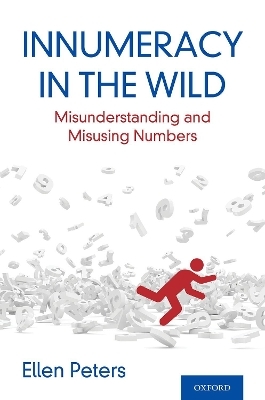
Innumeracy in the Wild
Oxford University Press Inc (Verlag)
978-0-19-086109-4 (ISBN)
This book presents the logic, rules, and habits that highly numerate people use in decision making. Innumeracy in the Wild also introduces two additional ways of knowing numbers that complement and compensate for lower numeric ability and explores how numeric abilities develop and where mistakes are made. It offers a state-of-the-art review of the now sizeable body of psychological and applied findings that demonstrate the critical importance of numeracy in our world. With more than two decades of experience in the decision sciences, Ellen Peters demonstrates how intervention can foster adult numeric capacity, propel people to use numeric facts in decision making, and empower those with lower numeracy to reason better.
Ellen Peters is Philip H. Knight Chair, Professor of Journalism and Communication, and Director of the Media Center for Science and Technology at the University of Oregon. She studies the basic building blocks of human judgment and decision making and is particularly interested in how people think and feel their way through decisions in our increasingly complex world.
Section I. Introduction
Chapter 1. The Types and Extent of Innumeracy
Section II. The Objectively Innumerate
Chapter 2. Innumeracy, Incomprehension, and Inconsistency
Chapter 3. Reliance on Heuristics and Concrete, Easy-to-evaluate Attributes
Chapter 4. Feelings and Frames
Section III. The Habits of the Highly Numerate
Chapter 5. Thinking Harder with Numbers
Chapter 6. The Highly Numerate Understand the Feel of Numbers
Chapter 7. Numeric Sensitivity and Consistent Use of Numbers
Chapter 8. Numerically Imperfect Reasoning among the Highly Numerate
Section IV. Objective numeracy, life outcomes, and what we don't know
Chapter 9. Numeracy's Secret Connection With Life Outcomes
Chapter 10. Issues and Opportunities in Objective Numeracy Research
Section V. The Emergence of Number Understanding
Chapter 11. The Approximate Number System (ANS) and Discriminating Magnitudes
Chapter 12. Genetics and Formal Education
Section VI. Two Additional Ways of Knowing Numbers
Chapter 13. Discriminating Numbers Allows for Better Decisions
Chapter 14. Subjective Numeracy and Knowing What You Know
Section VII. Numbers are Just Numbers - The Impotence of Data Versus the Power of Information
Chapter 15. Evidence-based Information Presentation Matters
Chapter 16. Provide Numbers But Reduce Cognitive Effort
Chapter 17. Provide Evaluative Meaning And Direct Attention
Section VIII. Becoming More Numerate
Chapter 18. Training Numeracy
Chapter 19. Reflections on Numeracy and the Power of Reasoning Numerically
Appendix
| Erscheinungsdatum | 04.06.2020 |
|---|---|
| Verlagsort | New York |
| Sprache | englisch |
| Maße | 236 x 155 mm |
| Gewicht | 576 g |
| Themenwelt | Geisteswissenschaften ► Psychologie ► Familien- / Systemische Therapie |
| Mathematik / Informatik ► Mathematik ► Arithmetik / Zahlentheorie | |
| Wirtschaft ► Betriebswirtschaft / Management ► Unternehmensführung / Management | |
| ISBN-10 | 0-19-086109-6 / 0190861096 |
| ISBN-13 | 978-0-19-086109-4 / 9780190861094 |
| Zustand | Neuware |
| Haben Sie eine Frage zum Produkt? |
aus dem Bereich



